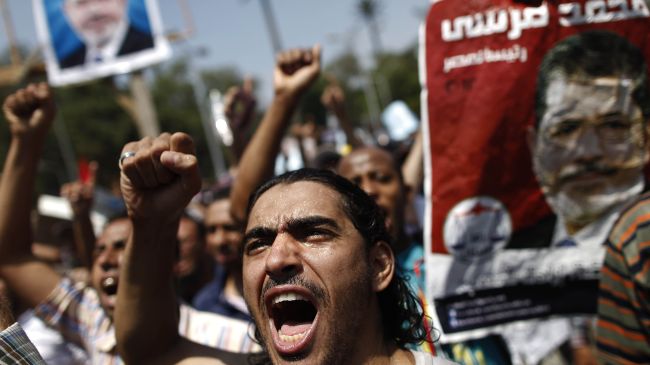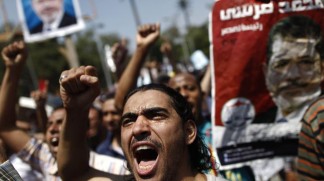US-backed deep state is Egypt’s enemy

The massacre this week in Cairo of more than 50 men, women and children by the Egyptian army shatters any illusions that the military is operating to promote national unity and progress towards democracy.
Reports and video footage indicate the Egyptian army embarked on a deliberate shoot-to-kill slaughter of a civilian protest gathered outside the Rabaa al-Adawiya mosque in the early hours of Monday, just when many were saying their dawn prayers.
The protesters, which included families, had been conducting their sit-in peacefully near the Republican Guard headquarters where deposed President Mohamed Morsi is believed held incommunicado since his arrest by the military last week.
The fact that army snipers opened fire from rooftops on the crowds below is an appalling “crime against humanity and all Egyptians,’ as politician Abdel Moneim Aboul Fatouh put it.
Only days before, there had been jubilant scenes of celebration in the capital, Cairo, by millions of anti-Morsi supporters, who had for months been calling for the ouster of the Muslim Brotherhood president. Those protests culminated in the biggest marches ever recorded in Egypt – and perhaps even the world – with up to 12-14 million taking to the streets of the North African country to denounce the first anniversary of Morsi’s election on 30 June.
On the evening of 3 July Egypt’s Supreme Council of Armed Forces (SCAF), led by defense minister Abdel Fattah Al-Sisi, delivered on a 48-hour ultimatum to President Morsi to stand down. The latter refused to comply and was promptly arrested. The next day, as rejoicing crowds thronged Cairo, military jets flew overhead in formation. The SCAF appointed the country’s top judge Adly Mansour as the interim president.
Mansour heaped praise on the military for putting Egypt back on the path towards its “glorious revolution.”
However, the cold-blooded mass murder this week by the Egyptian army puts paid to any notion that it is acting as a progressive, benign force. Nor is the military-appointed judge, Adly Mansour, acting as a custodian of the Egypt’s pro-democracy movement. The unelected Mansour has subsequently announced new personal powers in drawing up of a new constitution and, along with the military junta enforcing his office, he will oversee the calling of parliamentary and presidential elections, to be held sometime up to a year from now.
In essence, Morsi has been replaced by a re-consolidated dictatorship of Egypt’s “deep state” – the abiding power structure of the country – albeit with the new arrangement dressed up in the trappings of an “interim, technocratic” administration. In many ways, as we shall see below, the deep-state power structure never really gave way to an independent people’s president in the first place. The Egyptian regime – comprised of the twin pillars of the US-backed military and the judiciary – were always in the driving seat as they have been for the past 30 years.
While we cannot call the latest political maneuvers in Egypt a popular revolution, so, too, we cannot also refer to it is a coup. Morsi’s election was a heavily stage-managed event by the US-backed deep state to offset the popular uprising against the US-backed order. That order has always been and remains intact. Therefore, although reprehensible, it is a misnomer to call the recent events in Egypt “a coup.”
There is no doubt that the removal of Morsi was a popular demand. The Muslim Brotherhood politician was only elected with just over 50 percent of the vote in the presidential contest in May-June 2012. The turnout of voters was as low as 50 percent. That means Morsi and his particular Islamist administration may only have had a mandate from a quarter of Egypt’s total electorate, in a country of 85 million people.
The recent popular opposition among ordinary Egyptians coalesced in a broad coalition of secularists, leftists, workers, Christians, Copts and no doubt many Muslims who did not subscribe to the reactionary Sunni Islamist politics of the Muslim Brotherhood.
There is also no doubt that Morsi alienated many Egyptians through his ineptitude and embrace of sectarianism. His partisan politics of promoting the Muslim Brotherhood into positions of governance, media and public positions, while excluding all other sections of society, was a reckless abandonment of previously agreed consensual platforms.
Opponents accused him of rushing through a unilateral program of “Brotherhoodization.”
Morsi’s foreign policy demonstrated the reactionary and objectionable nature of his outlook. Following his inauguration last year, Morsi’s first overseas trip was to address the 16th Non-Aligned Movement summit in Tehran at the end of August. Initially, the move seemed like a bold, progressive one. It was the first visit by an Egyptian head of state to Iran since the Iranian revolution in 1979. Many expected a brave gesture of opening cordial relations between the most populous Arab nation and region’s Persian powerhouse.
But Morsi’s address to the NAM was an act of crass insensitivity and offensive peddling of imperialist politics when he denounced the Syrian government of President Bashar Al Assad. In that cringe-making performance, Morsi debased the very meaning of the NAM as a principled bastion of imperialist resistance.
More recently, he followed through on this promotion of the imperialist agenda of covert regime change in Syria by unilaterally cutting off diplomatic relations with Damascus and closing the Syrian Embassy in Cairo. In an odious display of violent sectarianism, Morsi attended a major rally of Sunni clerics and supporters at a Cairo stadium last month calling for jihad against “infidels” in Syria – meaning Shia Muslims, Alawites, Christians and others who support the government of Bashar Al-Assad. Within days of that rally, four Shias were lynched by a mob in a village near the Egyptian capital – their bloodied bodies were dragged through the streets.
So, indeed, over the past year since taking office Morsi managed to antagonize large swathes of the Egyptian population, including millions of Muslims. But to say that his removal from office represents a defeat for “political Islam” is too broad a generalization. It is a defeat specifically for a reactionary brand of rightwing, conservative Islamism espoused by the Sunni Muslim Brotherhood, which has, in fact, defiled Islam as a tool for imperialism in the Middle East.
The question is: if Morsi and the Egyptian Muslim Brotherhood were such loyal lackeys of imperialism why have the US, its Western allies and the Sunni Gulf monarchies all given their tacit, or open, assent to his deposal? Saudi Arabia, the United Arab Emirates and Qatar have sent congratulations to the interim president, Adly Mansour, even though the oil sheikdoms funneled billions of dollars to prop up Morsi. The US and Britain have been more circumspect, but significantly they have not criticized what appears to be an outrageous interference in civic politics by the Egyptian military – an intervention that has suddenly become much more sinister in light of the latest massacre.
The answer is not that these erstwhile friends wanted to defeat political Islam per se, but rather the deposal of Morsi was seen as an urgent step towards managing the ongoing Arab Spring uprising that first emerged in early 2011.
The last thing that the Western imperialist powers and their [Persian] Gulf Arab puppets want to see is for the Middle East and North Africa region to succumb to a full democratic uprising. That is why when the uprisings first kicked off in January 2011, the West promptly jettisoned their existing client dictators, Ben Ali in Tunisia and Hosni Mubarak in Egypt. The popular groundswell shook the imperialist architecture of the vital oil-rich region to its core.
Of particular danger was the collapse of the autocratic regimes in the Persian Gulf, headed up by the House of Saud. Again, that is why the West has colluded assiduously with the Persian Gulf dictatorships to try to crush the pro-democracy uprising in Bahrain.
It is also why the United Arab Emirates last week sentenced 68 of its nationals to punitive imprisonment of up to 15 years. Among the convicted were lawyers, teachers and professors who belong to the Al Islah organization, which is linked to the Muslim Brotherhood. Most of the convicted had been arrested during 2011 and 2012 and had done nothing more radical than mildly calling for democratic reform in the absolute monarchy.
That move, as well as the recent U-turn towards Morsi and the Brotherhood in Egypt, illustrates the contradictory, cynical nature of the Persian Gulf Arab dictators and their Western patrons. The Muslim Brotherhood is tolerated, indeed used, as a proxy force for regime change in Syria and elsewhere, but if it is not tolerable closer to home if it begins to sow discord and destabilization of the all-important status quo. The status quo may be secular, Wahhabi, fascist, Zionist, whatever, as long as it serves Western capitalist imperialist interests.
In Egypt, the Western imperial powers acquiesced to the Muslim Brotherhood gaining parliamentary seats and presidency because those powers knew that, in the face of popular uprising during 2011, a seeming concession would have to be made to appease the people. But note that from the outset of Hosni Mubarak’s ouster in February 2011 until the election of Morsi in June 2012, the country was under de facto martial law of the Mubarak regime military junta.
Also, the Mubarak-era judiciary – the second pillar of the deep state – worked to ensure that the shortlist of presidential candidates presented to the people was such as to not present any radical, progressive alternative to the status quo. In the end, Egypt’s supposedly “first free” presidential election was between Mohamed Morsi and the former prime minister under Mubarak, Ahmed Shafiq. That can hardly be said to be a free, democratic choice.
As one Egyptian put it in the days before Morsi’s deposal last week, “The only reason why he [Morsi] is in power is that we chose him over Ahmed Shafiq, Hosni Mubarak’s alter ego. We now regret it and we will topple him.”
Morsi appears to have made the mistake of thinking that he was a real president with real independent powers, when in fact he was only ever meant to serve as a puppet for the US-backed deep state of Egypt. By agitating the population with his reactionary sectarian politics, Morsi was crossing the red line of destabilizing the regime by inadvertently re-energizing a widespread popular revolt.
He was fomenting – albeit unwittingly – a renewal of the Arab Spring that remains such a mortal threat to the imperialist hegemony across the Middle East. Morsi therefore, had to go, and with the blessing of Washington, London and the [Persian] Gulf Arab dictators.
The Egyptian military and judiciary – as well as a motley crew of opportunist career politicos like Mohamed ElBaradei – are certainly not on the side of the people in their quest for democratic freedom. That quest for the Egyptian masses will only be realized when the US-backed deep state of Egypt, as in other parts of the Middle East, is vanquished by a genuine people-led coup and revolution.








